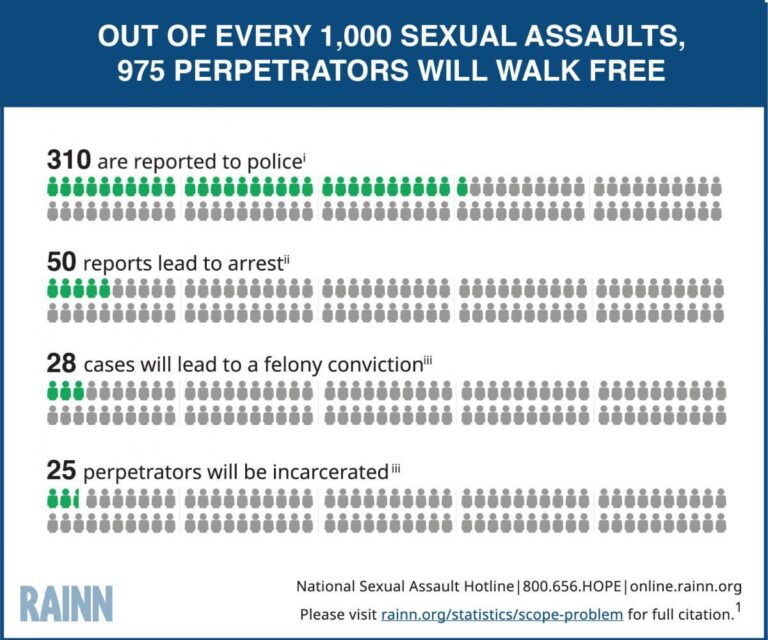A recent investigation by NBC News has revealed a startling reality within the criminal justice system: fewer than 4% of reported sex crimes result in a conviction. This alarming statistic underscores the profound challenges victims face in seeking justice and highlights systemic issues ranging from evidentiary hurdles to prosecutorial discretion. As conversations around sexual violence continue to gain prominence nationwide, the investigation sheds critical light on the gap between reporting and legal accountability.
Challenges Faced by Survivors in Reporting and Prosecution
Survivors of sexual crimes face a labyrinth of obstacles when attempting to seek justice, contributing to the alarmingly low conviction rates. One significant barrier is the pervasive mistrust of the legal system. Many survivors fear disbelief or victim-blaming attitudes from law enforcement and prosecutors, which often discourages them from reporting the crime altogether. The process can be retraumatizing, with survivors subjected to invasive questioning and the need to repeatedly recount their experiences during investigations and trials.
Additionally, logistical and systemic issues amplify the challenge. These include:
- Lengthy case backlogs that delay trials and prolong uncertainty
- Insufficient training for legal professionals in handling sensitive sexual assault cases
- Under-resourcing of support services like counseling and victim advocacy
- High standards of proof that are difficult to meet without corroborative evidence
| Barrier | Impact on Survivors |
|---|---|
| Lack of Trust in Authorities | Reduced reporting rates |
| Trauma from Retelling | Psychological distress and withdrawal |
| Delays in Prosecutorial Process | Case abandonment or plea deals |
| High Evidentiary Standards | Difficulty securing convictions |
Impact of Underreporting on Crime Statistics and Public Perception
Underreporting of sex crimes significantly skews official crime statistics, leading to a distorted picture of the prevalence and severity of these offenses. Many victims choose not to come forward due to fear of retaliation, societal stigma, or mistrust in the justice system. As a result, the recorded data often captures only a fraction of actual incidents, which in turn influences policy decisions, resource allocation, and public awareness campaigns. This gap in reporting perpetuates a cycle where the true scale of sex crimes remains hidden from lawmakers and the general public, hindering efforts aimed at prevention and support for survivors.
Moreover, the public perception of sex crimes is deeply affected by the low conviction rates and underreporting. The following factors contribute to this complex dynamic:
- Misconception of crime frequency: With so few cases officially documented, many believe sex crimes are less common than they truly are.
- Victim-blaming culture: The stigma attached to reporting discourages victims and fuels societal misunderstanding.
- Reduced trust in law enforcement: Repeated failures to secure convictions can erode confidence in the justice process.
| Aspect | Impact of Underreporting |
|---|---|
| Crime Data Accuracy | Significantly underestimated incidence rates |
| Policy Making | Insufficient funding and focus on survivor services |
| Public Awareness | Low awareness and misconceptions about prevalence |
| Victim Support | Inadequate support mechanisms and resources |
Reforming Policies to Support Victims and Strengthen Legal Outcomes
Addressing the alarming conviction gap in sex crimes demands a fundamental overhaul of the legal framework. Current policies often fail to provide victims with the necessary support and protection throughout the judicial process, contributing to a climate where many cases never reach conviction. To reverse this trend, lawmakers and advocacy groups are pushing for reforms that:
- Enhance victim protection by ensuring privacy and minimizing retraumatization during investigations and trials.
- Implement trauma-informed training for law enforcement and judicial personnel to handle sensitive cases more effectively.
- Expand access to legal aid so victims can navigate the complexities of the justice system without financial barriers.
Beyond victim support, reform efforts also emphasize strengthening prosecutorial strategies and evidence standards. This requires a coordinated approach that combines improved forensic technology, greater transparency in case handling, and updated legal definitions to reflect the nuances of sex crimes more accurately.
| Policy Area | Proposed Reform | Expected Impact |
|---|---|---|
| Victim Support | Trauma-informed care protocols | Higher reporting rates, reduced trauma |
| Judicial Process | Privacy protections for victims | Increased willingness to testify |
| Legal Aid | Free legal counseling services | Improved case preparation |
| Prosecution | Enhanced forensic support | Stronger evidence-based convictions |
Final Thoughts
The stark reality revealed by the NBC News investigation underscores a critical gap in the justice system’s ability to hold perpetrators of sex crimes accountable. With less than 4% of these cases resulting in conviction, the findings prompt urgent questions about the barriers survivors face in seeking justice and the systemic reforms needed to address them. As the conversation around sexual violence continues, this report serves as a sobering reminder of the work still required to ensure that survivors’ voices are heard and that perpetrators are brought to account.







